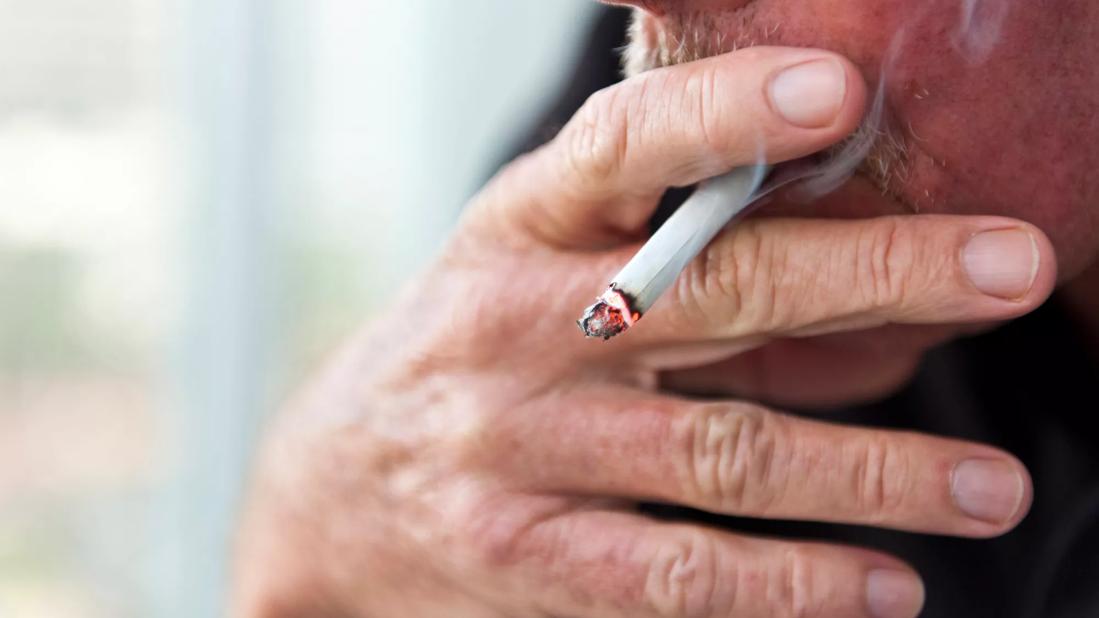Short-term relief from nicotine brings long-term problems

Image content: This image is available to view online.
View image online (https://assets.clevelandclinic.org/transform/b8fc81e9-d81f-4bdf-818a-5a91a6fdda0a/SmokingOldMan-scaled_jpg)
Man smoking a cigarette
Do you look to smoking for relief from a bad back? Or aching joints? Or abdominal pain?
Advertisement
Cleveland Clinic is a non-profit academic medical center. Advertising on our site helps support our mission. We do not endorse non-Cleveland Clinic products or services. Policy
Think twice before lighting up that cigarette. “Nicotine-induced pain relief is short-term. Over time, smoking may actually worsen your pain,” says pain management specialist Crawford Barnett, MD.
Smokers are nearly three times as likely to get lower back pain. Smoking may aggravate abdominal pain and joint pain, as well. In fact, smoking may increase pain sensitivity in general.
About 18% of people in the United States are smokers, according to the Centers for Disease Control and Prevention. Yet smokers make up more than 50% of patients who seek pain treatment.
The nicotine in tobacco can trick the body into feeling good — at first. It triggers the release of chemicals, like dopamine, which give off a satisfying, “reward” sensation. It’s part of what makes smoking so addictive.
But that same tobacco also impairs the delivery of oxygen-rich blood to your bones and tissues. Decreasing blood and nutrient flow can cause degeneration, particularly in discs of the spine, which already have more limited blood flow. The result can be lower back pain and sometimes osteoporosis.
Physicians also link smoking with fatigue and slower healing, factors that make painful conditions more prominent. Researchers are exploring even more physiological reasons why smoking makes people with fibromyalgia, arthritis and other chronic pain hurt more.
Advertisement
“Almost everyone knows smoking can cause cancer, lung disease and cardiovascular disease,” says Dr. Barnett. “But not everyone realizes that smoking can make your pain worse.”
To make matters worse, when smokers suffer from debilitating pain, potentially life-changing treatments may not work.
“Smokers aren’t the best candidates for implantable devices such as neurostimulators, which block pain sensation,” says Dr. Barnett. “Smoking impairs the immune system and increases the risk of infection after surgery.”
Dr. Barnett actively counsels patients to quit smoking. “You may look to cigarettes for help coping with pain, anxiety or stress, but there are healthier ways to do that,” he says.
Here’s what he suggests:
You can also start a new exercise program. Exercise activates endorphins, chemicals in the brain that can help block or lessen pain.
“Quitting smoking may be one of the most significant things you can do to both improve your health and manage your pain,” says Dr. Barnett.
Advertisement

Sign up for our Health Essentials emails for expert guidance on nutrition, fitness, sleep, skin care and more.
Learn more about our editorial process.
Advertisement
Health benefits start within 20 minutes and continue to grow for years after
Each comes with substantial health risks and should be avoided
Toxic chemicals stay on surfaces long after smoke clears
Gets the facts about what smoking does to your voice
This tobacco trend is toxic for teens
Smoking has health consequences whether you smoke a little or a lot
Both can help reduce pain, but they’re very different in terms of origins, philosophies and practices
Even only a couple cigarettes a day can lead to potentially deadly lung diseases like COPD and emphysema
Type 2 diabetes isn’t inevitable with these dietary changes
Applying a hot or cold compress can help with pain
Pump up your iron intake with foods like tuna, tofu and turkey